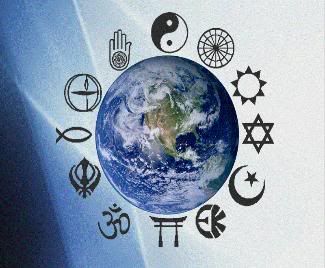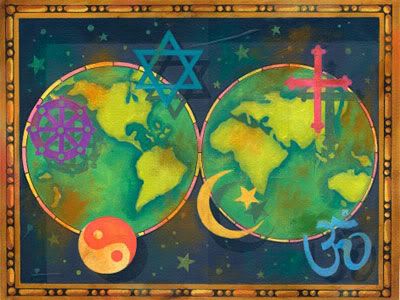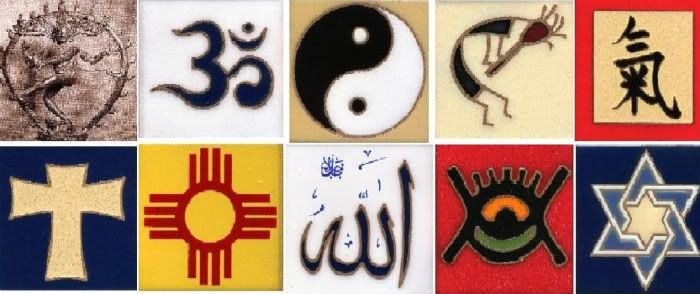 A lot of people think of the United States as a religious country, but really, it’s just a religious world out there. The US simply happens to have a lot of Christians. If you go hunting statistics, you’ll generally find estimates between about 12 and 17% for the “nonreligious” (atheist, agnostic, secular humanist, etc.) world population. From my personal heathen perspective, the religiosity in America and around the world is a bit puzzling. I doubt I will ever truly understand the need people seem to have for religion, though some of what I read indicates that it may increase life expectancy in some places and for various reasons. (But then again, so does owning a pet, so I figured I’d skip the religion bit and adopt four cats.)
A lot of people think of the United States as a religious country, but really, it’s just a religious world out there. The US simply happens to have a lot of Christians. If you go hunting statistics, you’ll generally find estimates between about 12 and 17% for the “nonreligious” (atheist, agnostic, secular humanist, etc.) world population. From my personal heathen perspective, the religiosity in America and around the world is a bit puzzling. I doubt I will ever truly understand the need people seem to have for religion, though some of what I read indicates that it may increase life expectancy in some places and for various reasons. (But then again, so does owning a pet, so I figured I’d skip the religion bit and adopt four cats.)
This season tends to annoy me a tad, primarily due to the “in your face” attitude of so many southern Christians. Most of them mean well, of course, so it’s hardly something I feel comfortable directly criticizing; it still makes for many moments of slight vexation and exasperation, however, which I do my best to cover with a polite smile.
I’m one of those people who truly prefers a “happy holidays” to a “merry Christmas” (from strangers, anyway), and that has been the case for well over a decade now. But down here in Alabama — the second most religious state in the union and primarily Christian — “happy holidays” are in short supply. No matter how far I go out of my way to wish people a nice “holiday” in local shops, I am going to get a “merry Christmas” out of all of them. It’s one thing coming from people who know me well enough to remember that I was raised in a Christian household and will be stuck doing the Christmas thing with family on December 25 along with most of the rest of the country. But it’s another thing altogether coming from strangers who have no idea whether I am Jewish, Muslim, Buddhist, atheist, or agnostic. Putting aside my problems with Christianity and organized religion in general, I just think it’s rude on principle. Were I Jewish, I feel pretty certain I would not be thrilled by the scores of Christmas wishes I would invariably receive every December regardless. There seems to be a kind of subtle arrogance in that which I am uncomfortable with — the idea that because one celebrates a certain holiday, it should be acceptable to wish a merry/happy whatever to everyone with whom one crosses paths… just strikes me as somewhat narrow-minded.
I know, I know — “Bah humbug.”
But whether I am a bitter, cynical young Scrooge or not, issues like this will slowly become more prominent in coming years, so we might as well begin considering them now. Already Faux News accuses people like myself of waging a war on Christmas every winter for complaining about nativity scenes placed in potentially inappropriate locations. The religious composition of the country is changing, though, and it’s something for Christians to keep in mind.
A Gallup poll of Americans’ attitudes towards religion released on Christmas Eve found significant recent increases in those responding either that they have no religious preference, that religion is not very important in their lives, or that they believe religion “is largely old-fashioned or out of date.”
Only 78% of Americans now identify as Christian, while 22% describe their religious preference as either “other” or “none.”
Most of these changes have occurred since 2000 and represent the first significant shift since a sharp decline in religious adherence during the 1970s. Over the last nine years, the number with no religious preference has grown from a level of around 8% to 13%. The number for whom religion is not very important has climbed from just over 10% to 19%. And the number who believe religion is out of date and has no answers for today’s problems has jumped from slightly more than 20% to 29%.

There appears to be a steady decline in people identifying with the Christian religion, along with a rise in the number of people identifying with no religion at all.
The trend results are based on annual averages of Gallup’s religious identity data in America that stretch back over 60 years. One of the most significant trends documented during this period is the substantial increase in the percentage of American adults who don’t identify with any specific religion. In 1948, only 2% of Americans did not identify with a religion. That percentage began to rise in the late 1960s and early 1970s. Eleven years ago, in 1998, 6% of Americans did not identify with a religion, a number that rose to 10% by 2002. This year’s average of 13% of Americans who claim no religious identity is the highest in Gallup records.
The percentage of Americans who identify as Catholic, Protestant, or some other non-Catholic Christian faith has been concomitantly decreasing over the years. This suggests that one of the major patterns of religious transition in America in recent decades has been the shift from identification as Christian to the status of having no specific religious identification.
In 1948, 91% of Americans identified with a Christian faith. Twenty years ago, in 1989, 82% of Americans identified as Christian. Ten years ago, it was 84%. This year, as noted, 78% of all American adults identify with a Christian faith.
So what do these trends mean for the US?
In the short term, probably very little. Religious members of the Democratic party are already less inclined to allow religious doctrine to dictate policy, and the religious Right will be loud and abrasive no matter how small it becomes. Religion — and Christianity in particular — will continue to be entangled with both domestic and foreign policy and many of the pressing issues of the times for many, many days and many moons to come. But today, this fine morning after Christmas, as I look at recent Gallup polls and graphs, my hopes of one day receiving a nice, benign, secular “happy holidays” from a retail clerk while doing my holiday shopping have increased just a wee bit — and the thought of it makes me smile. (“And they say the Grinch’s sricki’s heart grew three sizes that day!”)
Whether you are celebrating Christmas, Hannukah, Kwanzaa, or something else — or just enjoying a bit of widespread Christianity-induced time off work — I hope you and your families are all happy, safe, and healthy. I do not tend to get sentimental about the season, but cheers and season’s greetings to those of you who do.
Happy holidays, my Moosey friends.

33 comments